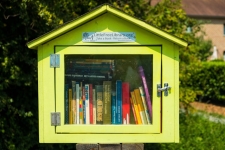Freedom to Read Statement
The freedom to read is essential to our democracy. It is continuously under attack. Private groups and public authorities in various parts of the country are working to remove or limit access to reading materials, to censor content in schools, to label "controversial" views, to distribute lists of "objectionable" books or authors, and to purge libraries. These actions apparently rise from a view that our national tradition of free expression is no longer valid; that censorship and suppression are needed to counter threats to safety or national security, as well as to avoid the subversion of politics and the corruption of morals. We, as individuals devoted to reading and as librarians and publishers responsible for disseminating ideas, wish to assert the public interest in the preservation of the freedom to read.
Most attempts at suppression rest on a denial of the fundamental premise of democracy: that the ordinary individual, by exercising critical judgment, will select the good and reject the bad. We trust Americans to recognize propaganda and misinformation, and to make their own decisions
Library Bill of Rights
The American Library Association affirms that all libraries are forums for information and ideas, and that the following basic policies should guide their services.
Books and other library resources should be provided for the interest, information, and enlightenment of all people of the community the library serves. Materials should not be excluded because of the origin, background, or views of those contributing to their creation.
Libraries should provide materials and information presenting all points of view on current and historical issues. Materials should not be proscribed or removed because of partisan or doctrinal disapproval.
Libraries should challenge censorship in the fulfillment of their responsibility to provide information and enlightenment.
Libraries should cooperate with all persons and groups concerned with resisting abridgment of free expression and free access to ideas.
A person’s right to use a library should not be denied or abridged because of origin, age, background, or views.
Libraries which make exhibit spaces and meeting rooms available to the public they serve should make such facilities available on an equitable basis, regardless of the beliefs or affiliations of individuals or groups requesting their use.
Adopted June 19, 1939, by the ALA Council; amended October 14, 1944; June 18, 1948; February 2, 1961; June 27, 1967; January 23, 1980; inclusion of “age” reaffirmed January 23, 1996.
Library Services

A Little Free Library is a “take a book, share a book” free book exchange located at the Mayfield Graves County YMCA. The library restocks it periodically when materials are needed.

Patrons may print, fax, scan, or copy with us for a small fee.
Print and Copy: 15¢ per page for print or copy.
Send a fax: $2 for 1st page of fax, and $1 per page for all other pages.
Receive a fax: $1

If we don't have the book you need, you can request it through interlibrary loan from another Kentucky library.

Local records available for genealogical research include death certificates, census data, family documents, birth records, and more. These items are for in-library use only and cannot be checked out.

Reserve a library meeting room online for non-profit, training, and educational organizations.

Free notary service for legal documents. You must bring a photo I.D. like a driver's license. Call 270-247-2911 ext.3 to set up an appointment.

Use desktop computers with a library card or guest pass. Computers use a Windows-based operating system and connect to the internet. Please see the Internet and Hot Spot Use Policy below for details. Wi-Fi available throughout the building.